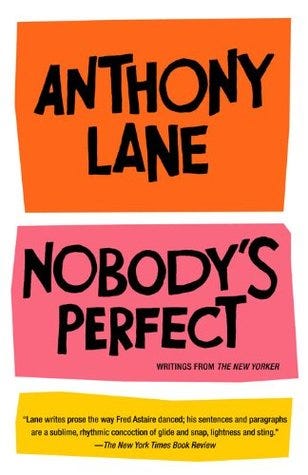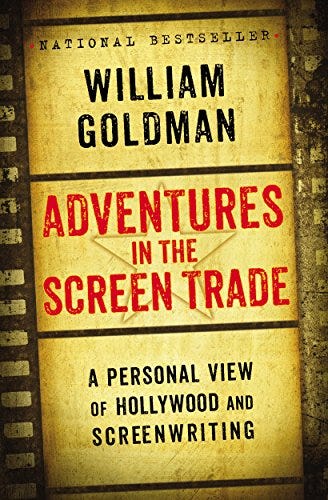5 Books about Movies for Your Self-Isolation Reading
The Coen Brothers canon, Anthony Lane's career, William Goldman's adventures, Peter Leithart's reflections on Terrence Malick, and Grant Horner's thoughtful conceit
Over the next few weeks we’ll be curating lists of the best books in various genres, from histories and poetry collections to crime novels and westerns, from books about sports to books about food, and more. Last week, our editors shared five food books. Today: we suggest five movie books worth reading. If you like this free content, please consider subscribing to the full FORMA Journal experience. It comes with the print edition, too, and you can save 20% when you subscribe now.

The Coen Brothers: This Book Really Ties the Films Together (2018) | Adam Nayman
One of the best books of pop-culture scholarship of the last few years, Adam Nayman’s book is consumed both with the literary and cinematic influences that bred the Coen canon and with the process by which the Coens work. The Coen’s genius is a “dual tension,” he writes: “they are rigorous craftsmen who know exactly what they’re doing, and yet they sculpt characters who rarely have a clue. They also produce artworks that seem perfectly formed and impenetrable, and yet also prove . . . to be wide open to rigorous analysis and desperate speculation alike.” Writing in-depth about each film in chronological order (interspersed with interviews with frequent Coen collaborators), Nayman explores the layers of the individual films, and manages to tell the creative story of two brothers who have changed the movies forever and for good. This is a book about specific filmmakers, but it’s also about the movies and about creativity and the ever-merging line between oddity and genius.

Nobody’s Perfect: Writings from the New Yorker (2003) | Anthony Lane
Anthony Lane is the rarest of rarities: a decent movie critic. There is no shortage of critics, and no shortage of critics enamored of their own cleverness; Lane is one of the few who is clever enough to justify being so enamored but avoids it all the same. He is also an old moralist, and while he is a keen observer of technicalities like camera angles and wardrobe choice, he spends most of his time judging films on what they ought to have done or left undone. He kneads his moralizing into trademark pithy prose that informs and entertains with apparent and enviable ease. It is as sparkling in praise as it is devastating in blame. One relishes a good Lane takedown: “…Pearl Harbor maintains the mood, pulsing with fervor as it tells a tale familiar to every child in America: how a great nation was attacked and humbled by the imperious pride of Ben Affleck.” Lane is at his best, though, when he is relishing the work of great actors: “Thank goodness for Philip Seymour Hoffman, who keeps his certainties while all around are losing theirs. He knocks back each of his scenes like a double brandy.”
This collection includes the best of his The New Yorker writings from the nineties, which runs beyond reviews to director profiles, literary essays on the likes of Eliot and Waugh (whom Lane has more in common with than he’d care to admit), and even a comical dressing-down of cookbooks. I have been a fan of Lane’s writing for some time and his powers are waning of late. These are not the days for new wine from the market, though, but reliable vintages from the cellar, and Nobody’s Perfect is a very good year indeed. Criticism—dare I say nonfiction—has never been so incisive or so readable.

Shining Glory: Theological Reflections on Terrence Malick’s Tree of Life (2013) | Peter Leithart
Many film critics found themselves playing the role of amateur theologian when they attempted to review Terrence Malick’s Tree of Life, while the film simultaneously enticed theologians into trying their hands as amateur film critics. Both combinations were hit or miss. Peter Leithart’s Shining Glory: Theological Reflections on Terrence Malick’s Tree of Life puts him in a third category. A gifted theologian, Leithart plays to his strengths, and instead of writing a movie review he chooses Malick’s departures from film convention as his starting point. Tree of Life is not primarily a narrative, nor is it linear; it is a film of images, emotions, and ideas—“there are more ideas in the film than there are minutes,” Leithart writes. Its arrangement—it’s soaring, falling, swelling, and circling back on itself—are more akin to a symphony than a film. Leithart’s theological brilliance rests in his ability to read the images of Scripture and tune his ear to the music of their ceaseless recurrence, self-reference, and amplification, noting the accumulation of pathos along the way. Leithart is really Malick’s ideal viewer and, while he has his own qualms with some the director’s aforementioned “ideas,” his reflections will help facilitate the engagement such a great and complicated film deserves.

Meaning At the Movies: Becoming a Discerning Viewer | Grant Horner
Most cinematic “worldview” talk feels like Michael Scott’s revamped Diversity Day on The Office: everyone reduced to cringe-inducing stereotypes. Fight Club is nihilistic, Avatar is pantheistic, dust your hands and move on. Grant Horner does a fine job acknowledging that movies do, in fact, present ideas, while also insisting that a good film is too complex to be boiled down to a philosophy. Cinematic craft takes a backseat to philosophy in Horner’s approach and he prefaces the main body of his book with a chapter titled “How to Interrogate a Movie” that includes overviews of prevalent philosophical views (moral absolutism, optimistic progressivism, etc.). It always reminds me of a Billy Collins poem, “Introduction to Poetry” (“I want them to waterski / across the surface of a poem… / But all they want to do / is tie the poem to a chair with rope / and torture a confession out of it.”). Nevertheless, he warns his reader that every filmmaker is a complex and often confused bundle of ideas and views, and understanding what philosophies to look for in a movie is only useful when you recognize their spiritual corollaries and what they reveal about man in general. Horner’s most valuable insight is his contention that cinema (as much as or more than other artforms) incarnates the Pauline idea that all men “surpress the truth in unrighteousness.” Movies hold up a “celluloid mirror” to the heart of man, and more is revealed than he realizes. What comes out in a film is not so much the filmmaker’s monolithic intellectual philosophy, but his deepest fears, longings, and vision of the good life. After he introduces this conceit, Horner proceeds to “read” his favorite films—every one of them now heavy with significance—and every reading compels. Let him teach you to approach films this way and they will shine with new meaning.

Adventures in the Screen Trade: A Personal View of Hollywood and Screenwriting (1982) | William Goldman
William Goldman was one of the greatest screenwriters to work in Hollywood, and yet he is legendary as much for his no-holds-barred industry-memoirs as he is for All the Presidents Men, Butch Cassidy and the Sundance Kid, Marathon Man, and The Princess Bride. And the memoirs in Adventures in the Screen Trade make up his non-fiction masterpiece. On the one hand, it’s a book about the creative process — where to start, what to do when you get stuck, how to handle disappointment; but it’s also about one man’s war with The Way Things Are Done. Goldman wasn’t one to be pushed around and the reflections in this volume chronicle his distaste for the Hollywood system as much as they reveal his love of movies themselves. Ultimately, Goldman was a born storyteller and his gift is evidenced on every page here — whether he’s telling about his experiences with famous actors, his trouble getting movies made, his own creative struggles, or the actual screenplay of Butch and Sundance, (which is included in the book and is, for my money, the best screenplay written to-date). To read this book today is to be reminded that some things never change. Hollywood still wants tentpole comic book movies, as it has since the beginning; the creative process is never easy; and, in the end, nobody beats the system. Except sometimes.
If you like this list, you’ll love what a full subscription gets you: 2 issues of our print journal each year plus weekly digital content covering the best books in culture, history, and religion being written today. Subscribe now!
Recently, from FORMA Journal


